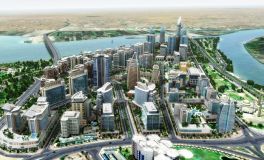Al Mogran project, Khartoum’s hope to become a business hub
June 18, 2006 (KHARTOUM) — Wedged between the White and Blue Niles, a huge shimmering complex of glass and steel is set to rise from the heart of Khartoum, as the Sudanese capital seeks to leap into modernity.
 Sudan, the biggest country in Africa by area, remains beset by rebellion and humanitarian tragedies, but the Al Mogran project epitomises Khartoum’s ambitions to become a regional business hub.
Sudan, the biggest country in Africa by area, remains beset by rebellion and humanitarian tragedies, but the Al Mogran project epitomises Khartoum’s ambitions to become a regional business hub.
“Hotels, offices and villas will soon spring up from this land that had so far been used as a rubbish dump,” said Hani Al Khidir, chairman of the Alsunut Development Co, which manages the project.
Alsunut is supported by Khartoum state and by the national insurance fund in what its brochure says aims to be “one of the fastest growing real estate developers, with a dominant presence in trade and commerce in the region.”
The Sudanese government had sought since the early 1990s to develop this horn of land jutting into one of the widest parts of the Nile.
But continuing civil conflict in Sudan had kept investors at bay, including multi-billionaire Saudi Prince Al Walid bin Talal.
Al Mogran got off the drawing board when private Sudanese conglomerate DAL joined with the authorities to create Alsunut in January 2005, days after a landmark peace deal marked the end of 21 years of bloody north-south civil war.
In the very centre of a typically horizontal African capital, the promoters of the four-billion-dollar project want to raise a symbol of Khartoum’s post-war renaissance and a beacon of modernity in the region.
“We looked for inspiration by studying similar construction projects in the United Arab Emirates, in Malaysia and in Beirut and we drew up our own after making sure it was adapted to our culture and environment,” Khidir explained.
The gleaming 160-acre (396 hectare) business complex is due to house 58,000 employees and the adjacent residential zone will include about 1,000 villas, 6,700 apartments, schools, hotels, hospitals and an 18-hole golf course.
Although Al Mogran could give Khartoum a new face, comparisons with Dubai’s breathtaking growth are more than premature, Khartoum-based businessmen warned.
“You need people with dreams if you want anything to change, so this is an excellent initiative but it will take a long time,” said Nadim Ghantous, general manager of the Lebanese bank Byblos.
“It’s a slow birth. The situation cannot be compared to Dubai. There isn’t even a real boom in Sudan but a project like this could have a snowball affect,” he said.
The first office buildings of the complex, which Alsunut tips to become the modern business hub of East Africa, are to due to be ready by the end of 2007. The target date for completing the residential area is 2015.
Al Mogran has so far sparked interest mainly from Arab and Muslim investors, as well as China, which absorbs 80 percent of Sudan’s oil exports.
“The residential project is also likely to attract expatriates and Sudanese from the diaspora who want to find the same quality of life they had at home,” Khidir said.
Khartoum houses thousands of foreigners involved in the huge humanitarian operation covering Sudan as well as contractors and businessmen rebuilding the vast country, devastated by decades of war.
The average annual income barely exceeds 500 dollars and Khidir admits that the state-of-the-art complex is likely to widen the gap between its wealthy future residents and the impoverished population living on its fringes.
“But we hope that Al Mogran will be a source of inspiration for the government to modernise the entire capital.”
(ST)
